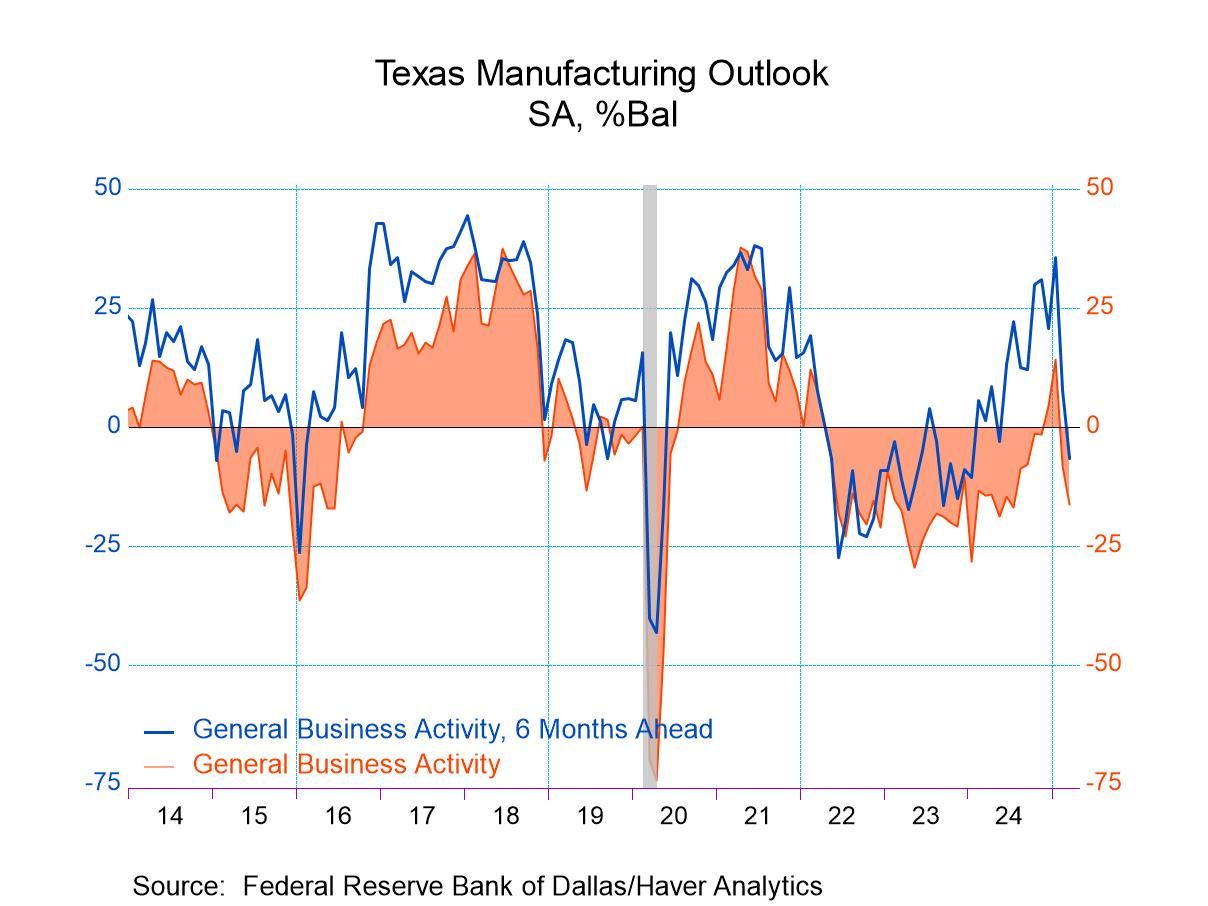Texas Manufacturing Activity & Expectations Readings Decline Further in March
by:Tom Moeller
|in:Economy in Brief
Summary
- General business activity index falls to 10-month low.
- New orders growth & labor market readings remain negative.
- Production & shipments improve.
- Future business index turns decisively negative.


The rate of decline in manufacturing activity in Texas accelerated in March, according to the Texas Manufacturing Outlook Survey conducted by the Federal Reserve Bank of Dallas. The General Business Activity index fell to -16.3 this month from -8.3 in February. It was the lowest level since July 2024 and is down from a high of +14.1 just three months ago. A lessened 12.7% of respondents reported improved business activity in March while an increased 29.0% of respondents reported a worsening. The company outlook index deteriorated to -10.7 this month from -5.2 in February, and compared to -13.3 twelve months ago.
The employment index fell sharply in March to -4.6, its lowest point since May of last year. A steady 11.8% of respondents reported higher employment this month while a higher 16.4% reported a decline. Also moving lower, the growth rate of orders index weakened to -8.1 from -7.5. It was down from its recent high of +4.8 last April. The wages & benefits reading slipped while unfilled orders remained sharply negative.
Showing improvement, the production index rose to 6.0 from -9.1. An increased 28.8% of respondents reported a rise in output while a lessened 22.8% reported a decline. The hours-worked index improved to -2.9 from -14.2. The shipments index rose marginally to 6.1, as 26.7% of respondents reported an increase, while 20.6% indicated a decline. The delivery times measure surged to 3.4 from -6.3.
Inflation indicators eased this month. The index for prices received for finished goods fell to 6.3 after increasing to 7.8 in February. It remained well below a high of 47.4 in March 2022. A lessened 13.4% of respondents reported raising prices this month while 7.1% reported lowering prices. The index of prices paid for raw materials rose to 37.7 this month from 35.0 in February. The index remained up from a low of 1.0 in June 2023 but below a high of 82.2 in June 2021.
Expectations of future manufacturing activity weakened greatly this month, and most categories were down. The future general business activity index plummeted to -6.6 this month from +7.7 in February. The future new orders growth and production growth measures fell along with future delivery times, and future wages & benefits plummeted. Moving slightly higher was the future employment reading.
Each index is calculated by subtracting the percentage reporting a decrease in activity from the percentage reporting an increase. When all firms report rising activity, an index will register 100. An index will register -100 when all firms report a decrease. An index will be zero when the number of firms reporting an increase equals the number reporting a decrease. Data for the Texas Manufacturing Outlook, conducted by the Federal Reserve Bank of Dallas, can be found in Haver's SURVEYS database.


Tom Moeller
AuthorMore in Author Profile »Prior to joining Haver Analytics in 2000, Mr. Moeller worked as the Economist at Chancellor Capital Management from 1985 to 1999. There, he developed comprehensive economic forecasts and interpreted economic data for equity and fixed income portfolio managers. Also at Chancellor, Mr. Moeller worked as an equity analyst and was responsible for researching and rating companies in the economically sensitive automobile and housing industries for investment in Chancellor’s equity portfolio. Prior to joining Chancellor, Mr. Moeller was an Economist at Citibank from 1979 to 1984. He also analyzed pricing behavior in the metals industry for the Council on Wage and Price Stability in Washington, D.C. In 1999, Mr. Moeller received the award for most accurate forecast from the Forecasters' Club of New York. From 1990 to 1992 he was President of the New York Association for Business Economists. Mr. Moeller earned an M.B.A. in Finance from Fordham University, where he graduated in 1987. He holds a Bachelor of Arts in Economics from George Washington University.
More Economy in Brief
 Global| Feb 05 2026
Global| Feb 05 2026Charts of the Week: Balanced Policy, Resilient Data and AI Narratives
by:Andrew Cates






